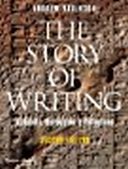

| Online: | |
| Visits: | |
| Stories: |

| Story Views | |
| Now: | |
| Last Hour: | |
| Last 24 Hours: | |
| Total: | |
History [and UFO reports] have been Fictive from the very Beginning?
Thursday, December 22, 2016 5:39
% of readers think this story is Fact. Add your two cents.
“Fake news” is not new.
Ancient events were turned into fictive, myth-generating stories at the outset of oral and recorded accounts by primitive mankind.
A book I just received, The Story of Writing; Alphabets, Hieroglyphs, & Pictograms (Second Edition) by Andrew Robinson [Thames & Hudson, London, 1995/2007] had this:
“ … there is … a dark side to the spread of writing that is present throughout its history … Writing has been used to tell lies, as well as truth … to make minds lazy as well as to stretch them.” [Page 8]
“Socrates … writing in his story of the Egyptian god Thoth, the inventor of writing, who [was told by a king] … You have invented an elixir not of memory, but of reminding; and you offer your pupils the appearance of wisdom … when they will seem to know many things, but are for the most part ignorant.” [Page 8]
We all know (or should) that Homer’s account of the Trojan War, in The Iliad and Odysseus, became laden with accretions over the course of its (oral) telling, ending up fraught with extraneous exaggerations and amendments when set down:
“In antiquity, the Greeks applied the Iliad and the Odysseyas the bases of pedagogy. Literature was central to the educational-cultural function of the itinerant rhapsode, who composed consistent epic poems from memory and improvisation, and disseminated them, via song and chant…
Venetus A, copied in the 10th century AD, is the oldest fully extant manuscript of the Iliad.”
And we know that The Hebrew Bible (The Holy Bibleof Christians also) is a compilation of legends, not reportage, per se, [source Ginzberg] as are the mythical tales of the Greeks, and all other cultures of early mankind.
What is this penchant for elaboration or exaggerated representation that men and women need to indulge in?
(The Creative Ice Age Brain: Cave Art in the Light of Neuroscience by Barbara Olins Alpert , noted earlier here, seems to indicate that cave art, a form of “history writing,” shows reality as it was perceived by Neolithic man, but that’s not the case at all. Cave art, like writing or the oral tradition of history, is also encumbered by alterations of reality, as is art throughout the ages.)
It seems that all accounts of events, including news accounts, are marred by biases of memory or design.
Humans are seemingly flawed when it comes to relating events, even those they are privy to.
There are reasons for this, which I won’t go into right now, but we can assume that UFO reports that have accumulated over the years, in the modern era also, are replete with errant information.
Yes, people try to report their sightings and experiences correctly, but they can’t. The process for “reportage” is flummoxed by an inherent human flaw in its story-telling.
So, UFO buffs need to step back and take UFO accounts with a grain of salt.
What is the truth of things? We can never really know, can we?
RR
http://ufocon.blogspot.com – The UFO Iconoclast(s)
Source: http://ufocon.blogspot.com/2016/12/history-and-ufo-reports-have-been.html



